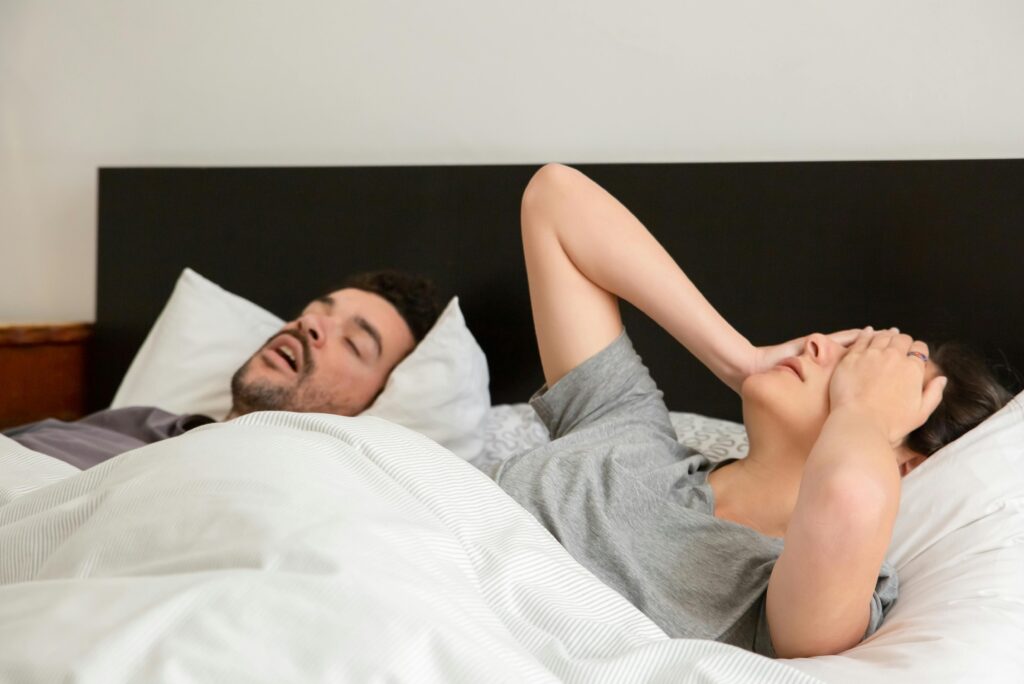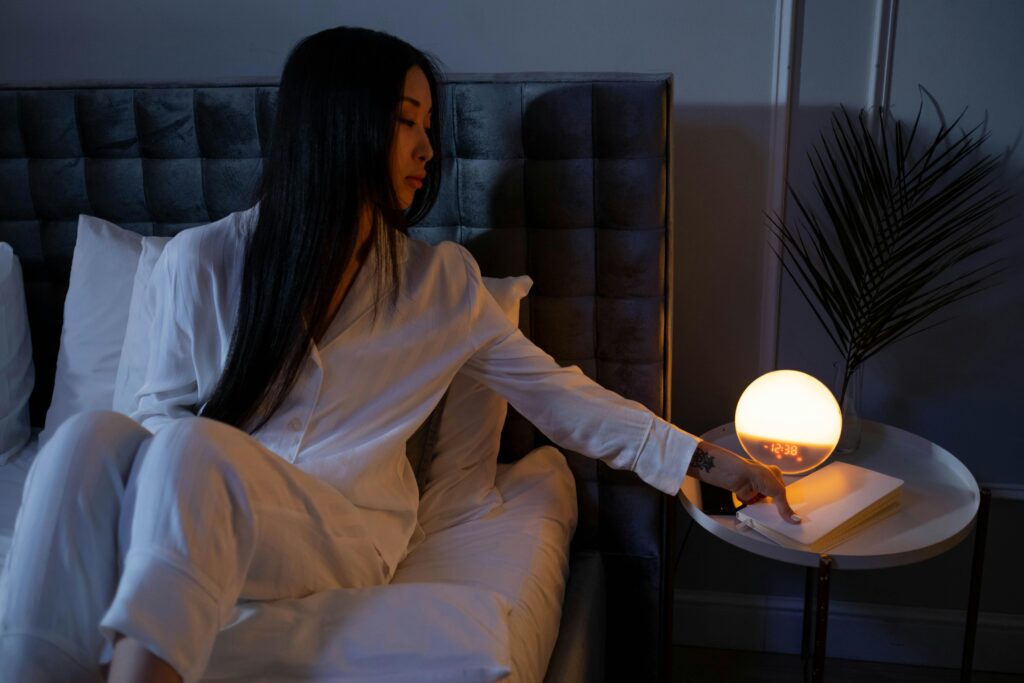Introduction
A restful night’s sleep is essential for maintaining physical and mental well-being, but for millions of people, sleep disorders like insomnia can make this difficult. If you struggle with poor sleep quality, you’re not alone, and thankfully, there are several sleep health and insomnia solutions available. In this guide, we will explore effective strategies to improve your sleep health, from healthy sleep hygiene practices to natural remedies for insomnia. By making small, manageable changes to your routine, you can get closer to achieving the quality sleep you deserve.

1. Understanding the Importance of Sleep Health
Before delving into the specifics of sleep health and insomnia solutions, it’s important to understand why sleep matters. Sleep is not just about rest – it is a vital process that rejuvenates the body and mind. Quality sleep boosts immune function, supports cognitive abilities, and helps regulate mood. Furthermore, good sleep improves memory, enhances productivity, and reduces the risk of chronic conditions such as heart disease, diabetes, and obesity.
Without proper sleep, our bodies struggle to perform daily tasks effectively. Chronic insomnia or poor sleep health can result in irritability, poor concentration, and an overall reduction in life satisfaction. Thankfully, there are sleep health and insomnia solutions that can help improve your overall well-being.
2. Effective Sleep Hygiene Practices
The foundation of any sleep health and insomnia solutions approach begins with establishing good sleep hygiene. Sleep hygiene refers to the habits and practices that promote a consistent and restful night’s sleep. These strategies help train your body to fall asleep and stay asleep naturally.
1. Establish a Consistent Sleep Schedule
One of the most effective sleep health and insomnia solutions is sticking to a regular sleep schedule. Going to bed and waking up at the same time every day – even on weekends – helps regulate your internal body clock, making it easier to fall asleep and wake up refreshed.
2. Create a Restful Sleep Environment
Your environment plays a critical role in sleep quality. Ensure your bedroom is cool, quiet, and dark. Invest in comfortable bedding, including a quality mattress and pillow, and limit any distractions that may disrupt your sleep. If needed, consider using blackout curtains or a white noise machine for a more tranquil environment.
3. Limit Stimulants Before Bed
Caffeine, nicotine, and alcohol can all interfere with your sleep quality. These substances act as stimulants and can keep you awake longer or disrupt the deeper stages of sleep. Avoid consuming these substances at least 4–6 hours before bedtime to ensure the best sleep possible.

3. Natural Sleep Aids and Remedies
In addition to sleep hygiene, sleep health and insomnia solutions often involve using natural remedies to encourage restful sleep. Many people find relief from insomnia through natural sleep aids that promote relaxation without the need for prescription medications.
1. Melatonin Supplements
Melatonin, a hormone that regulates sleep-wake cycles, can be an effective supplement for people who struggle to fall asleep. While melatonin is naturally produced by the body, supplements can help people with insomnia or jet lag fall asleep faster. Always consult a healthcare provider before using melatonin, especially if you are taking other medications.
2. Herbal Remedies
Several herbal remedies have been traditionally used to help with sleep. Chamomile tea, valerian root, and lavender oil are popular choices. These herbs promote relaxation and help ease anxiety, making it easier to fall asleep. You can find them in various forms, such as teas, capsules, or oils.
3. Relaxation Techniques
Relaxation techniques, such as meditation, deep breathing exercises, or progressive muscle relaxation, are also great sleep health and insomnia solutions. These techniques help calm your mind and body before bedtime. Practicing these habits for 10–15 minutes before sleep can significantly improve your ability to fall asleep and stay asleep throughout the night.
4. Tips to Combat Insomnia Naturally
If you’ve tried various sleep health and insomnia solutions without success, it might be time to address deeper issues. Insomnia is often a symptom of stress, anxiety, or underlying health conditions. By incorporating specific lifestyle changes, you can combat insomnia naturally and improve sleep quality.
1. Disconnect from Screens
The blue light emitted by phones, computers, and televisions disrupts the production of melatonin, making it harder for you to fall asleep. A simple solution is to avoid using screens for at least one hour before bedtime. Instead, read a book, take a warm bath, or practice a relaxation technique to prepare your body for sleep.
2. Practice Gratitude and Journaling

A cluttered mind often interferes with sleep. Writing down your thoughts or practicing gratitude can help alleviate anxiety before bedtime. Spend a few minutes each evening journaling or noting things you are grateful for. This simple activity can calm the mind and prepare you for a restful sleep.
3. Be Mindful of What You Eat
Certain foods can either aid or hinder sleep. Avoid heavy meals, spicy foods, and sugary snacks close to bedtime. Instead, opt for sleep-friendly snacks like bananas, almonds, or a small bowl of oatmeal. These foods contain natural compounds that help promote relaxation.
5. Benefits of Quality Sleep on Mental and Physical Health
When it comes to sleep health and insomnia solutions, the ultimate goal is to improve both mental and physical health. The benefits of quality sleep extend far beyond just feeling rested.
1. Mental Health Benefits
Sleep is essential for mental clarity, mood regulation, and emotional well-being. Quality sleep helps reduce the risk of anxiety and depression. It also improves memory retention and cognitive function, making it easier to tackle daily challenges with focus and creativity.
2. Physical Health Benefits
Sleep plays a vital role in physical recovery and immune function. When you sleep, your body works to repair cells, tissues, and muscles. It also strengthens the immune system, making it more effective at fighting off illnesses. Regular, quality sleep is also associated with lower blood pressure, better heart health, and improved metabolism.
Tips, Natural Remedies, and Treatment Options

1. Sleep Hygiene Tips
Sleep hygiene refers to the habits and practices that promote better sleep quality and overall sleep health. By maintaining good sleep hygiene, individuals can improve their sleep patterns, making it a crucial aspect of Sleep Health and Insomnia Solutions. Key tips include maintaining a consistent sleep schedule, creating a relaxing bedtime routine, and optimizing the sleep environment (such as reducing light exposure and keeping the room cool). Proper sleep hygiene can help combat common insomnia problems by establishing a predictable rhythm, promoting deep and restorative sleep. Maintaining good sleep hygiene is one of the simplest Sleep Health and Insomnia Solutions anyone can adopt to enhance their overall wellness.
2. Natural Sleep Aids
When it comes to managing insomnia, many people seek Sleep Health and Insomnia Solutions that don’t rely on prescription medications. Natural sleep aids, such as melatonin supplements, herbal teas like chamomile or valerian root, and essential oils like lavender, can help promote relaxation and ease the transition into sleep. Incorporating these into your nighttime routine can alleviate stress and anxiety, creating the perfect environment for sleep. Many prefer these options due to their gentle, non-habit-forming nature. Including natural sleep aids as part of your routine can offer effective Sleep Health and Insomnia Solutions without harsh side effects.
3. Cognitive Behavioral Therapy for Insomnia (CBT-I)
Cognitive Behavioral Therapy for Insomnia (CBT-I) is a clinically proven method for treating chronic insomnia. This form of therapy focuses on identifying and changing negative thoughts and behaviors that may be preventing restful sleep. It is often considered one of the most effective Sleep Health and Insomnia Solutions available, especially for those who struggle with long-term sleep issues. Through guided techniques such as sleep restriction, relaxation training, and cognitive restructuring, CBT-I can help individuals break the cycle of insomnia and regain control over their sleep. For long-term Sleep Health and Insomnia Solutions, CBT-I offers a structured approach that tackles the root causes of insomnia.
4. Lifestyle Changes for Better Sleep
Making simple lifestyle changes can significantly improve sleep quality, contributing to better Sleep Health and Insomnia Solutions. Regular physical activity, such as daily exercise, can help regulate your body’s circadian rhythm. Avoiding caffeine and large meals before bedtime can also make a difference in falling and staying asleep. Managing stress through relaxation practices such as meditation or yoga can further help individuals reduce anxiety and tension that might disrupt sleep. Incorporating lifestyle changes is one of the most sustainable Sleep Health and Insomnia Solutions, creating a lasting impact on your ability to sleep well.
5. Sleep Environment Optimization
The sleep environment plays a vital role in determining the quality of your sleep. Optimizing your bedroom for better rest is an essential step in Sleep Health and Insomnia Solutions. A comfortable mattress, optimal room temperature, and minimizing noise and light exposure can significantly enhance your ability to fall asleep quickly and enjoy uninterrupted rest. Also, incorporating calming elements such as soothing colors or soft bedding can help make your space more inviting for sleep. Optimizing your sleep environment should be a priority in your Sleep Health and Insomnia Solutions for long-term success in managing insomnia.

Conclusion
Achieving optimal sleep health is essential for maintaining overall well-being, and by using effective sleep health and insomnia solutions, you can overcome common sleep issues and enjoy restful nights. From improving sleep hygiene to incorporating natural remedies and relaxation techniques, there are plenty of ways to address your insomnia and promote better sleep. Remember, consistency is key to seeing results, and the long-term benefits of quality sleep are well worth the effort.
FAQs About Sleep Health and Insomnia Solutions
1. How can I tell if my insomnia is due to stress or a medical condition?
If your insomnia is accompanied by symptoms like chronic pain, shortness of breath, or extreme fatigue, it may indicate an underlying medical condition. In this case, it’s important to consult with a healthcare provider. However, if your sleep troubles stem from stress or anxiety, relaxation techniques and lifestyle changes may help.
2. How long does it take for natural sleep aids to work?
Natural sleep aids, such as melatonin or herbal remedies, may take anywhere from 30 minutes to an hour to show effects. However, it’s important to give them time to work and use them consistently for best results.
3. What is the best sleep routine for improving sleep health?
The best sleep routine involves consistent bedtimes, creating a relaxing environment, limiting screen time, and incorporating stress-relieving activities such as journaling or meditation before bed. These strategies are key sleep health and insomnia solutions that help optimize sleep quality.